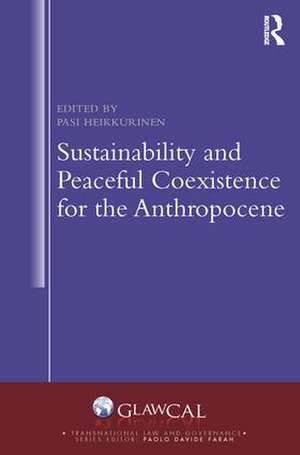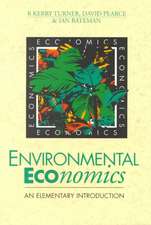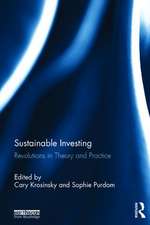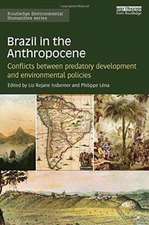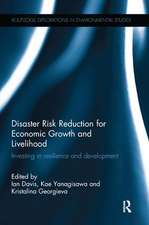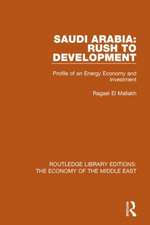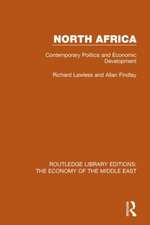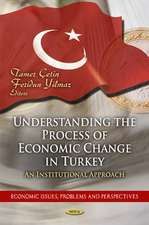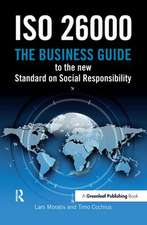Sustainability and Peaceful Coexistence for the Anthropocene: Transnational Law and Governance
Editat de Pasi Heikkurinenen Limba Engleză Hardback – 23 mai 2017
To analyse the root problems and consequences of unsustainable development, as well as to outline rigorous solutions for the contemporary age, this transdisciplinary book brings together natural and social sciences under the rubric of the Anthropocene. The book identifies the central preconditions for social organization and governance to enable the peaceful coexistence of humans and the non-human world. The contributors investigate the burning questions of sustainability from a number of different perspectives including geosciences, economics, law, organizational studies, political theory and philosophy. The book is a state-of-the-art review of the Anthropocene debate and provides crucial signposts for how human activities can, and should, be changed.
| Toate formatele și edițiile | Preț | Express |
|---|---|---|
| Paperback (1) | 258.91 lei 6-8 săpt. | |
| Taylor & Francis – 12 dec 2019 | 258.91 lei 6-8 săpt. | |
| Hardback (1) | 764.22 lei 6-8 săpt. | |
| Taylor & Francis – 23 mai 2017 | 764.22 lei 6-8 săpt. |
Preț: 764.22 lei
Preț vechi: 1102.80 lei
-31% Nou
Puncte Express: 1146
Preț estimativ în valută:
146.24€ • 156.37$ • 121.93£
146.24€ • 156.37$ • 121.93£
Carte tipărită la comandă
Livrare economică 17 aprilie-01 mai
Preluare comenzi: 021 569.72.76
Specificații
ISBN-13: 9781138634275
ISBN-10: 1138634271
Pagini: 213
Ilustrații: 17
Dimensiuni: 156 x 234 x 16 mm
Greutate: 0.45 kg
Ediția:1
Editura: Taylor & Francis
Colecția Routledge
Seria Transnational Law and Governance
Locul publicării:Oxford, United Kingdom
ISBN-10: 1138634271
Pagini: 213
Ilustrații: 17
Dimensiuni: 156 x 234 x 16 mm
Greutate: 0.45 kg
Ediția:1
Editura: Taylor & Francis
Colecția Routledge
Seria Transnational Law and Governance
Locul publicării:Oxford, United Kingdom
Public țintă
Postgraduate and UndergraduateCuprins
Notes on contributors Foreword- Paolo Davide Farah. Acknowledgements Introduction Part I CONCEPTS, CAUSES, AND CONSEQUENCES 1. On the Emergence of Peaceful Coexistence Pasi Heikkurinen 2. The Anthropocene: A Geological Perspective Mark Williams, Jan Zalasiewicz and Colin Waters 3. Immigrants or Refugees of the Anthropocene: Adapting to or Denying Climate Change? Tarja Ketola Part II CAPITALISM AND NEOLIBERAL GOVERNMENTALITY 4. Capitalism and the Absolute Contradiction in the Anthropocene Toni Ruuska 5. Managing the Environment: Neoliberal Governmentality in the Anthropocene Jessica C. Lawrence Part III THINKING AND THE NON-HUMAN WORLD 6. ‘It’s Getting Better and Better, Worse and Worse, Faster and Faster’: The Human Animal in the Anthropocene Todd LeVasseur 7. Scale, Noosphere Two, and the Anthropocene J. Mohorčich Part IV POST-GROWTH SOCIETIES AND ORGANISATIONS 8. Engaging with the Plutocene: Moving towards Degrowth and Post-Capitalistic Futures Marko Ulvila and Kristoffer Wilén 9. Conceptualizing Worker Agency for the Challenges of the Anthropocene: Examples from Recycling Work in the Global North Eeva Houtbeckers and Tiina Taipale 10. From Exploitation and Expansion to Evolutionary Coexistence: A New Realism for Life beyond the Anthropocene Karl Johan Bonnedahl Index
Notă biografică
Pasi Heikkurinen is a lecturer at the Sustainability Research Institute (SRI) at the University of Leeds, UK.
Descriere
To analyse the root problems and consequences of unsustainable development, as well as to outline rigorous solutions for the contemporary age, this transdisciplinary book brings together natural and social sciences under the rubric of the Anthropocene. The book identifies the central preconditions for social organization and governance to enable the peaceful coexistence of humans and the non-human world. The contributors investigate the burning questions of sustainability from a number of different perspectives including geosciences, economics, law, organizational studies, political theory and philosophy. The book is a state-of-the-art review of the Anthropocene debate and provides crucial signposts for how human activities can, and should, be changed.
